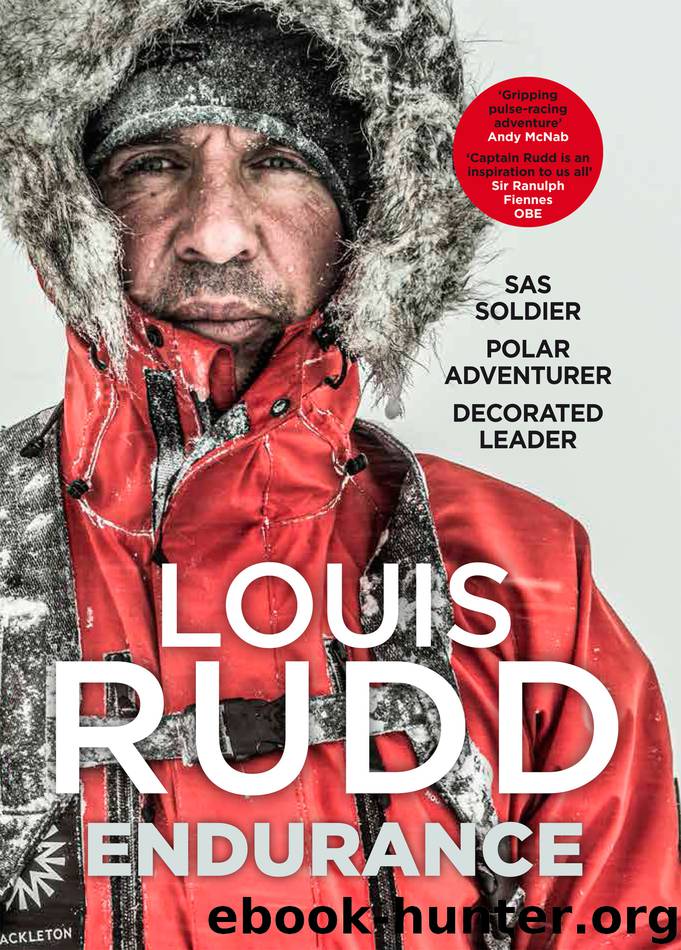Endurance by Louis Rudd

Author:Louis Rudd
Language: eng
Format: epub
Publisher: Pan Macmillan UK
We skied 5.9 nm in four hours at an altitude of 1,675 ft. Dropped off by Twin Otter at 1500 hrs Chilean time. Short forty-minute flight from Union Glacier. Bit of turbulence and Ollie felt really sick and was sweating like mad. Weather was beautiful and no wind. Skied off and as we climbed wind picked up to a 20 mph headwind. Went past Tam’s tent at base of climb. Found last hour difficult and felt really tired once inside tent. Used vapour barrier liners but they made heels sore. Chris got a blister on his toe.
I woke at 7 a.m. the following morning, thick-headed and sleepy. I gave Ollie a shake and in silence we got the cooker going and began the process of melting ice for breakfast. I had forgotten how grim mornings were in Antarctica. The willpower required to leave the warmth of a thick, down-filled sleeping bag should not be underestimated. Even on a good day, the temperature inside the tent was around -5°C before the cooker got going. The morning routine followed that of the evening, with the monotonous process of melting snow and preparing hot drinks and breakfast and hot water for our flasks for the day.
By 9 a.m. everyone was ready to set off for the first leg. I asked James to lead and told him to keep the pace steady. I wanted to avoid what the military call ‘leader’s legs’, when the leader sets off at a really fast pace. This can happen at any time of the day, not just the start, even after the individual had been struggling to keep up with the pace when further down the line. It’s as if the leader gets a new lease of energy. The guys were very fit and highly motivated, and had the potential to really push the pace. At forty-seven I was almost twice the age of Alex, James and Ollie, who were in their mid to late twenties, while Chris was thirty-four and Al was forty-two. This was definitely a marathon and not a sprint, and the key for me was to dictate a pace that we could sustain for two months.
It was also always in the back of my mind that I needed to have some spare capacity, just in case I had to make some important judgement calls. I never wanted to be at my physical limits and on the bones of my arse, or completely mentally exhausted, because if I was struggling to look after myself, then I wasn’t going to be able to make the best decisions as a leader. This was something that I had learnt in the SAS. As a leader, especially on operations, it is vital that you never put yourself in a position where you are mentally incapable of making crucial decisions. This can often mean that others in the team may have to take a greater share of the physical burden so that the leader can remain mentally fit. It is
Download
This site does not store any files on its server. We only index and link to content provided by other sites. Please contact the content providers to delete copyright contents if any and email us, we'll remove relevant links or contents immediately.
Endurance: Shackleton's Incredible Voyage by Alfred Lansing(3838)
Tokyo Vice: An American Reporter on the Police Beat in Japan by Jake Adelstein(3439)
The Motorcycle Diaries by Ernesto Che Guevara(3332)
Alive: The Story of the Andes Survivors by Piers Paul Read(3309)
Apollo 8 by Jeffrey Kluger(3199)
Exit West by Mohsin Hamid(3180)
Aleister Crowley: The Biography by Tobias Churton(3019)
Annapurna by Maurice Herzog(2839)
Full Circle by Michael Palin(2768)
Into Thin Air by Jon Krakauer(2699)
A Wilder Time by William E. Glassley(2362)
Kitchen confidential by Anthony Bourdain(2305)
In Patagonia by Bruce Chatwin(2267)
Finding Gobi by Dion Leonard(2259)
Into the Wild by Jon Krakauer(2122)
L'Appart by David Lebovitz(2115)
The Ogre by Doug Scott(2113)
The Stranger in the Woods by Michael Finkel(1921)
An Odyssey by Daniel Mendelsohn(1920)
